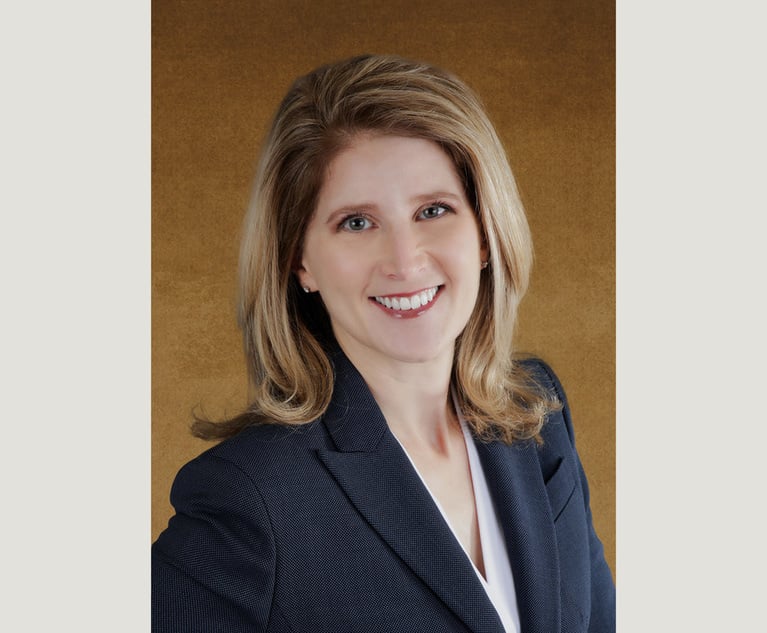 Estelle McGrath of Marshall Dennehey. Courtesy photo
Estelle McGrath of Marshall Dennehey. Courtesy photo EEOC Mediation: Five Things to Consider Before Participating
A former employee files a charge with the Equal Employment Opportunity Commission (EEOC) against their prior employer alleging that they were unlawfully terminated as a result of discrimination. The parties may be advised that they have the ability to participate in the EEOC's mediation program. When your client asks if they should participate, what should you say?
October 23, 2023 at 10:26 AM
8 minute read
Special SectionsA former employee files a charge with the Equal Employment Opportunity Commission (EEOC) against their prior employer alleging that they were unlawfully terminated as a result of discrimination. The parties may be advised that they have the ability to participate in the EEOC's mediation program. When your client asks if they should participate, what should you say? Here are five things to discuss with your client so that they can make an informed decision about whether or not to participate.
- They should be advised that the process is completely voluntary. If they elect mediation, the mediation process pauses any investigation, production of documents and avoids costly expenses.
If either side should decline mediation, then the charge would be sent to the enforcement unit for investigation. What does that typically mean? It means that the employer would be asked to submit a position statement in response to the charge and, thereafter, may be asked for documentation. The investigator then sends the position statement and documents to the employee to review and respond. The investigator typically does not conduct interviews, but instead relies on the documents submitted by each side. If the employee does not request a right to sue letter after the EEOC has had at least 180 days to investigate, the investigation process typically lasts for 10 months to a year. However, your client should be warned that the process usually takes longer than a year.
- They should be notified that the mediation process is free.
The EEOC assigns the mediation to either a mediator on staff or a pro bono mediator. This means that it will not cost your client any money to participate in the mediation. Compare this to what it may cost your client should the action continue to federal court where the parties will be mandated to participate in some form of alternative dispute resolution (ADR) and private mediators tend to charge between $3,500 to $6,000 for their services.
- They should be made aware that the mediation is conducted via an electronic platform.
A link is sent to the parties, so your client can conveniently participate from the comfort of their own home or office. This is helpful, as mediations can take hours and it can give them the flexibility of tending to other needs during breaks. It also might make them more comfortable during the process, as they are not required to travel and are in a familiar place. Your client should be told that while the mediation process can be lengthy, it is not nearly as time consuming as the time it would take to prosecute or defend a lawsuit.
- They should be counseled that the mediation process is confidential.
The mediator is tasked with acting as a neutral to determine whether the parties can amicably resolve the charge. The parties are required to sign a confidentiality agreement. Regardless of what occurs at the mediation, the mediator is not permitted to advise the investigator of what was discussed—only that the charge resolved or did not resolve. As such, the parties are able to speak freely and nothing said during the mediation can be used against them if the charge is not resolved. Further, the mediation process can shed light on your client's strengths and weaknesses and allow it to determine how best to proceed.
- If your client chooses to participate in the mediation process, you should recommend that your client attend.
After all, this is their case and they should want to hear what the other side has to say in order to determine how to proceed. While the EEOC suggests that all parties attend the mediation session, sometimes employers will send counsel in their stead. Whereas if the matter proceeds to federal court, the parties are required to attend an ADR session. Again, it is more important for the parties to be present to learn what the other side is going to say if this matter were to continue.
Explaining the EEOC Mediation Settlement Agreement
If an agreement is reached, the EEOC will draft a mediation settlement agreement (MSA) that must be signed by both parties. This is a pre-determined, basic form that the mediator must complete. There is not much leeway, as the mediator is unable to make any real change to said form.
This content has been archived. It is available through our partners, LexisNexis® and Bloomberg Law.
To view this content, please continue to their sites.
Not a Lexis Subscriber?
Subscribe Now
Not a Bloomberg Law Subscriber?
Subscribe Now
NOT FOR REPRINT
© 2025 ALM Global, LLC, All Rights Reserved. Request academic re-use from www.copyright.com. All other uses, submit a request to [email protected]. For more information visit Asset & Logo Licensing.
You Might Like
View All
Pa. Supreme Court to Decide Enforceability of 'Browsewrap' Arbitration Agreements
8 minute read
From a Mediator’s Perspective: Common Mis-steps That Parties Make at Mediation
6 minute readLaw Firms Mentioned
Trending Stories
Who Got The Work
J. Brugh Lower of Gibbons has entered an appearance for industrial equipment supplier Devco Corporation in a pending trademark infringement lawsuit. The suit, accusing the defendant of selling knock-off Graco products, was filed Dec. 18 in New Jersey District Court by Rivkin Radler on behalf of Graco Inc. and Graco Minnesota. The case, assigned to U.S. District Judge Zahid N. Quraishi, is 3:24-cv-11294, Graco Inc. et al v. Devco Corporation.
Who Got The Work
Rebecca Maller-Stein and Kent A. Yalowitz of Arnold & Porter Kaye Scholer have entered their appearances for Hanaco Venture Capital and its executives, Lior Prosor and David Frankel, in a pending securities lawsuit. The action, filed on Dec. 24 in New York Southern District Court by Zell, Aron & Co. on behalf of Goldeneye Advisors, accuses the defendants of negligently and fraudulently managing the plaintiff's $1 million investment. The case, assigned to U.S. District Judge Vernon S. Broderick, is 1:24-cv-09918, Goldeneye Advisors, LLC v. Hanaco Venture Capital, Ltd. et al.
Who Got The Work
Attorneys from A&O Shearman has stepped in as defense counsel for Toronto-Dominion Bank and other defendants in a pending securities class action. The suit, filed Dec. 11 in New York Southern District Court by Bleichmar Fonti & Auld, accuses the defendants of concealing the bank's 'pervasive' deficiencies in regards to its compliance with the Bank Secrecy Act and the quality of its anti-money laundering controls. The case, assigned to U.S. District Judge Arun Subramanian, is 1:24-cv-09445, Gonzalez v. The Toronto-Dominion Bank et al.
Who Got The Work
Crown Castle International, a Pennsylvania company providing shared communications infrastructure, has turned to Luke D. Wolf of Gordon Rees Scully Mansukhani to fend off a pending breach-of-contract lawsuit. The court action, filed Nov. 25 in Michigan Eastern District Court by Hooper Hathaway PC on behalf of The Town Residences LLC, accuses Crown Castle of failing to transfer approximately $30,000 in utility payments from T-Mobile in breach of a roof-top lease and assignment agreement. The case, assigned to U.S. District Judge Susan K. Declercq, is 2:24-cv-13131, The Town Residences LLC v. T-Mobile US, Inc. et al.
Who Got The Work
Wilfred P. Coronato and Daniel M. Schwartz of McCarter & English have stepped in as defense counsel to Electrolux Home Products Inc. in a pending product liability lawsuit. The court action, filed Nov. 26 in New York Eastern District Court by Poulos Lopiccolo PC and Nagel Rice LLP on behalf of David Stern, alleges that the defendant's refrigerators’ drawers and shelving repeatedly break and fall apart within months after purchase. The case, assigned to U.S. District Judge Joan M. Azrack, is 2:24-cv-08204, Stern v. Electrolux Home Products, Inc.
Featured Firms
Law Offices of Gary Martin Hays & Associates, P.C.
(470) 294-1674
Law Offices of Mark E. Salomone
(857) 444-6468
Smith & Hassler
(713) 739-1250







